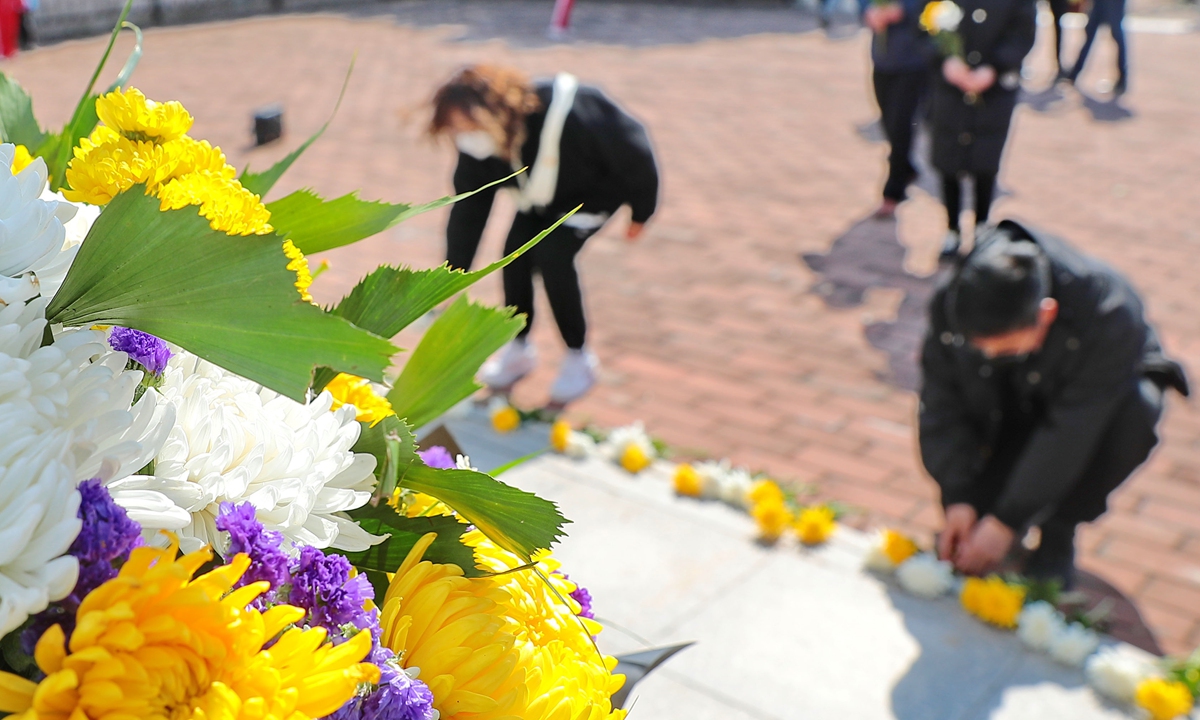
Residents of the Yulongwan community in Haigang district, Qinhuangdao, North China's Hebei Province, lay flowers in front of the Revolutionary Hero Monument on March 31, 2022, ahead of the Qingming Festival, or the Tomb-sweeping Day, which falls on April 5 this year. Photo: Xinhua
During the Qingming Festival, a traditional occa- sion for Chinese to honor their ancestors, people in the country and overseas paid tributes to their family ancestors as well as to the country’s martyrs.
Although offline commemorations around the country were greatly restricted by the epidemic, many people have paid their tributes online. Among them, the high level of enthusiasm among young people for the remembrance of the country's martyrs is a culturally remarkable change, experts said.
Over the past few days, officers and soldiers across China have paid tributes at various martyrs' cemeteries, visited revolutionary memorial sites and expressed their desire to draw strength from the spirit of the martyrs and continue their struggle, China's PLA Daily reported.
In Serbia, a number of Chinese nationals also paid tributes to those who were killed in the NATO bombing 23 years ago.
On Tuesday, the Chinese Embassy in Serbia organized a memorial ceremony at the former site of the Chinese embassy in Yugoslavia, where baskets and wreaths were laid to honor the three Chinese journalists killed by NATO. Nearly 100 local Chinese came to the site spontaneously to pay their respects.
In Ruijin in East China's Jiangxi Province, officers and soldiers went to the memorial tower for the Red Army martyrs to pay tributes to their heroic sacrifice. Revisiting that glorious history, officers and soldiers made promises to push forward the great cause that the revolutionary martyrs had struggled and died for.
Many cemeteries and memorials suspended offline memorials this year for the Qingming Festival due to the sporadic outbreaks of the COVID-19 epidemic. More Chinese participated in commemorative activities online.
Many netizens left online messages in memory of the four Chinese soldiers who died in the China-Indian border clash in 2020.
Under the post posted by China Central Television in memory of the four martyrs, more than 40,000 netizens sent their memories by commenting, reposting and liking.
In martyr Chen Xiangrong's hometown Pingnan county, East China's Fujian Province, many people sent bouquets via package delivery to the county to be dedicated to the martyr, as the official ritual was canceled due to the epidemic control concerns.
The news that martyr Xiao Siyuan's younger brother Xiao Rongji has signed up for the army has also drawn the attention and tribute of netizens on China's Twitter-like platform Sina Weibo.
On Sunday, Xiao Rongji took up his post and officially started his military life. "I don't feel bitter and tired at all when I think of my brother who once stood guard on the snowy plateau," he said.
Many netizens left comments under the story, calling Xiao's family one of the heroes. "To forge ahead is the best consolation for your loved ones," one netizen wrote.
In East China's Jiangsu Province, although the Memorial Hall of the Victims in Nanjing Massacre by Japanese Invaders was temporarily closed due to the epidemic, many people still came to the square in front of the hall to lay flowers.
A man surnamed Yang received an order from Hong Kong to lay flowers on behalf of his compatriots who were killed in the massacre, according to media reports.
"I am very touched that our compatriots in Hong Kong are also thinking of our martyrs who were killed in the national tragedy," Yang said.
While the Chinese have long had a tradition of honoring their martyrs and passing on their spirit, the enthusiasm of young people to respect and pay tribute to them has risen significantly in recent years, a noteworthy phenomenon, observers noted.
China's younger generation has a marked rise in patriotism and a deeper understanding of both the struggles of the Chinese revolution and the history of the Communist Party of China (CPC), Zhang Yiwu, a professor at Peking University, told the Global Times on Tuesday.
"The education of the CPC history has further strengthened the spirituality and sentiment of the whole society in recent years," Zhang said. "Many young people now have a very moving empathy and awareness of martyrs, which is a remarkable cultural change."
Zhang noted that the rapidly advancing Chinese society still faces many new tests. "In today's world, the young people are drawing from the spirit of struggle and revolutionary sentiment of the martyrs to find their social identity, cultural identity and spiritual identity within themselves as a Chinese."




